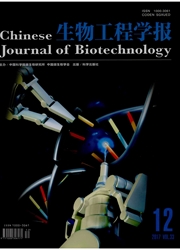

 中文摘要:
中文摘要:
人ARD1(human arrest defective 1,hARD1)基因被确定具有N-乙酰基转移酶活性,但其生理学功能并不清楚。为了探讨hARD1基因与肿瘤的关系,检测hARD1蛋白在不同肿瘤中的表达,克隆了hARD1基因并进行原核表达,利用镍离子螯合(His.bind)柱层析纯化,得到纯度达95%以上的hARD1蛋白。以纯化的重组蛋白免疫小鼠,制备了抗hARD1蛋白的抗血清。利用抗hARD1多抗血清检测常见的临床肿瘤病理组织,发现hARD1蛋白在乳腺肿瘤、前列腺癌,以及肺癌中有较高频率的表达,其中乳腺肿瘤中的表达频率最高,达到70%,远高于其他肿瘤组织。表明hARD1蛋白的高表达可能是乳腺肿瘤组织的一个标志,为进一步揭示hARD1与乳腺肿瘤的关系奠定了基础。
 英文摘要:
英文摘要:
Human arrest defective 1(hARD1) is an acetyltransferase; its physiological significance remains unclear. To explore the relationship between ARD1 protein and tumors, we detected the hARD1 protein in tumor tissues in vivo. We cloned hARD1 gene from Hela cell and construct recombinant plasmid pET28b-hARD1. The recombinant plasmid was transformed into E. coli BL21(DE3)plysS. hARD1 protein was expressed by inducing with IPTG(1 mmol/L) and purified up to 95% through Ni2+ chelation affinity chromatography. We used the purified hARD1 protein as antigen immunized the Balb/c mice and obtained the hARD1 specific polyclonal antiserum. Through immunohistochemical analysis of different tumor tissues in vivo, we found that hARD1 expressed at high frequency in breast cancer, prostate cancer and lung cancer, especially, hARD1 expression frequency in breast cancer was up to 70%, which is higher than in the other tumors. These results indicate that the high expression level of hARD1 could be an indicator of the breast cancer. This new finding would be a foundation to further explore the relationship between breast tumor and hARD 1.
 同期刊论文项目
同期刊论文项目
 同项目期刊论文
同项目期刊论文
 期刊信息
期刊信息
